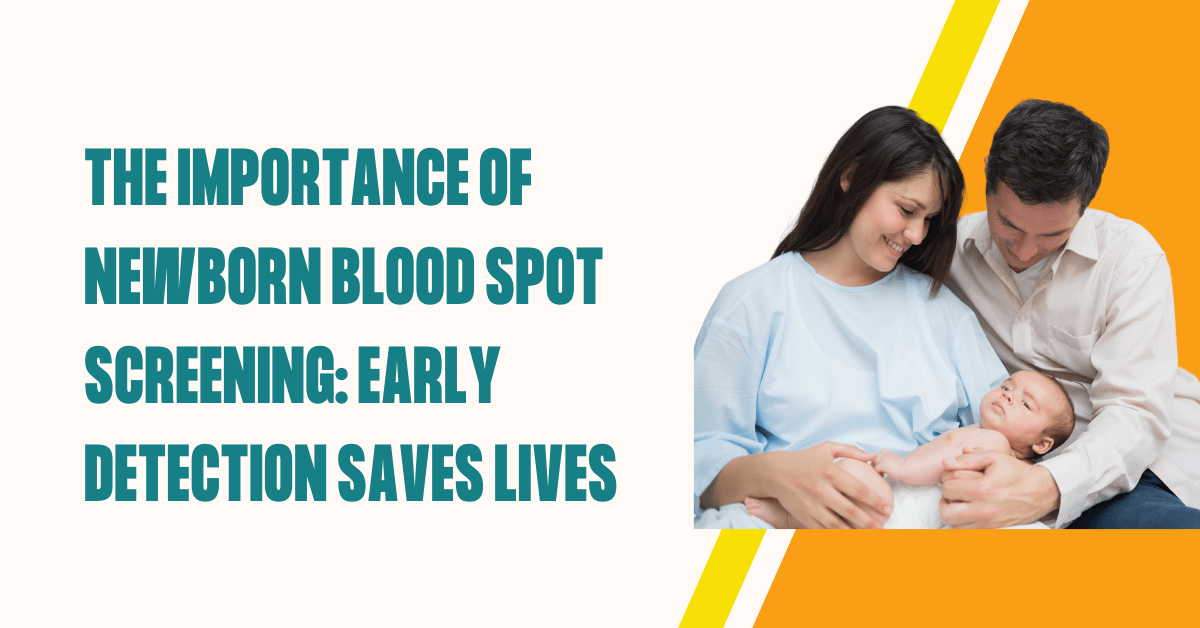Newborn blood spot screening, popularly known as the “heel prick test,” is one of the most important health measures. This simple but life-saving procedure plays an important role in the diagnosis of rare but serious conditions, which can lead to serious complications, developmental delays, or even death. A newborn screening, which is normally administered between 5 to 9 days of delivery, permits healthcare practitioners to begin therapy early.
What is Newborn Blood Spot Screening?
Newborn screening is a vital process that involves a small prick on a baby’s heel to collect a few drops of blood. These blood samples are carefully placed on specific cards that are then sent to a laboratory for thorough testing to detect genetic, metabolic, and other potential abnormalities. The specific conditions screened for may vary by country, but commonly included diseases are PKU, cystic fibrosis, sickle cell anemia, and congenital hypothyroidism. This essential screening helps identify these conditions early on, allowing for prompt intervention and treatment.
Why Early Detection is Crucial
The vast majority of conditions identified through newborn screening are initially asymptomatic, meaning that they do not exhibit noticeable symptoms at birth. However, if left untreated, these conditions can progress into severe and potentially life-threatening illnesses. For example, phenylketonuria (PKU) can lead to mental retardation, but if it is diagnosed early enough, the child can effectively manage the condition by making dietary changes and go on to lead a life similar to any other child. In a similar vein, the early diagnosis of congenital hypothyroidism allows for the administration of hormone replacement therapy, which can effectively manage the condition and prevent its potential complications.
Early identification of developmental delays in children is critical as it allows for timely intervention to minimize potential long-term effects. Babies born with these disorders can lead healthy lives if they receive proper management, which may include medications or dietary adjustments. Detecting these issues early not only improves the child’s quality of life but also provides essential support for their family, enabling them to navigate the challenges more effectively.
Impact on Families and Healthcare Systems
By identifying serious conditions early, newborn screening tests help reduce emotional and financial burdens on families. Parents can start receiving the appropriate treatments, resources, and support immediately now, avoiding long-term difficulties. Without early identification, families may face difficult and costly medical treatments or long-term care that may have been avoided with prompt action.
It’s crucial to understand the far-reaching impact of early disease detection on healthcare systems. By identifying and managing these conditions in their early stages, healthcare providers can effectively avoid the need for extensive and costly medical interventions down the line. For instance, taking a proactive dietary approach to managing PKU not only proves to be more cost-effective but also helps prevent the potential onset of severe neurological damage that often accompanies delayed diagnosis. Additionally, providing timely treatment significantly reduces the likelihood of protracted hospital stays or intricate medical procedures, thus easing the strain on healthcare resources.
Emotional and Psychological Support for Families
The early diagnosis through newborn screening tests is effective in medical terms and can be helpful in terms of the psychological burden of the parents. In cases where the family has their newborn diagnosed with a certain disease, it is advantageous because they are fully prepared to handle it emotionally and psychically. It also empowers parents to be involved in the control and direction of the child’s health and future.
Moreover, early detection means that children can receive the treatment and support they need to live normal lives, participating in everyday activities without the restrictions that may have otherwise been necessary. Families who receive this early diagnosis can face fewer emotional challenges in raising a child with special health needs.
Conclusion:
Why Newborn Screening is a Lifesaving Step – Newborn screening is a simple but critical test that can save lives by identifying dangerous diseases before symptoms develop. Early diagnosis is essential for giving prompt treatment and avoiding long-term consequences. Healthcare practitioners can improve children’s outcomes dramatically by screening neonates immediately after delivery. This crucial test ensures babies can grow and thrive without untreated health issues.
Located in the heart of West Yorkshire, MIRACLE INSIDE Diagnostic Scan Centre is the premier choice for parents seeking top-tier newborn screening tests. With a focus on precision and care, the center offers an extensive array of comprehensive prenatal and newborn screening services. Their specialization in early detection is supported by state-of-the-art diagnostic scans, providing parents with detailed insights into their baby’s health. Committed to empowering families, Miracle Inside delivers personalized care and draws upon professional expertise to guide parents in making informed decisions for their infants’ future.
